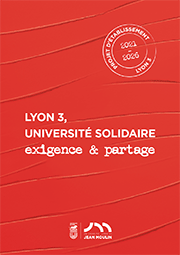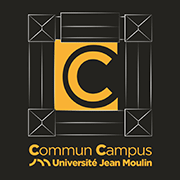AccueilRechercheProgrammes et productions scientifiquesThèsesThèses soutenuesThèses soutenues - 2006-2021Thèses soutenues - 2017
-
Partager cette page
- Recherche,
JOUBERT Didier
Les violences émeutières dans l’espace urbain : dynamique des phénomènes et organisation de la réponse sociale
Thèse en Droit mention Droit Privé soutenue le 3 juillet 2017.
Alors que la manifestation, son encadrement par les forces de sécurité intérieure et son environnement juridique ressortissent à la culture de l’organisation et de l’ordre, les violences émeutières relèvent, quant à elles, de comportements colériques naturels. Elles constituent un objet et un enjeu différents que traduisent notamment la récurrence des crises en milieu urbain et la difficulté d’y faire face de fa?on satisfaisante.
Sur le plan opérationnel comme sur le plan juridique, l’éventail de la réponse aux désordres est particulièrement large, mais il traduit également un double embarras :
? Les violences émeutières sont le plus souvent des violences d’expression. Qu’ils en soient conscients ou non, face à ces comportements, le juge et le politique se sont montrés fréquemment indulgents dans un contexte juridique où la liberté d’expression est un droit fondamental et la manifestation une conquête sans équivalent dans notre pays. Les réponses sociale et judiciaire se caractérisent donc par une mansuétude parfois légitime, parfois inadaptée mais souvent mal comprise.
? Les modes d’action policiers et les outils du Droit fa?onnés par l’environnement juridique et la culture de la manifestation, peuvent se révéler inadaptés pour répondre aux émeutes urbaines et conduire à des évolutions aussi variées qu’inappropriées comme la banalisation du recours à des régimes juridiques d’exception et la sédimentation d’une culture d’affrontement entre police et population.
Le concept retentissement / identification et l’analyse des colères rebelles et insoumises ouvrent la voie à une adaptation du droit et de la réponse sociale conciliant le respect des droits fondamentaux et le maintien de la paix publique dans l’espace urbain. Tel est l’enjeu de la dialectique ? Libertés - Droit - désordres ?.
The object of the research is to highlight that rioting violence cannot be dealt with without an evolution of the legal framework and public-order policing inherited from our History. Our way to manage public-order policing is particularly suitable to our French traditional demonstration pattern. It is significant and exemplary in many respects but that alone cannot close the debate about the forms of social reaction that would be necessary to answer the various forms of the repertoire of protest especially the complex dynamics of rioting disorders.
Even though the demonstration, its framing by the police and its legal framework are both an order issue and a cultural issue, rioting acts of violence are a natural irascible behaviour. Riots are an object and an issue which translate into in recurring urban crises and the difficulty to satisfactorily deal with them.
From an operational point of view and from a judicial one, there is a wide range of answers to the disorders but this results in a double embarrassment :
· Riots are very often a means of expression. Consciously or not, the judge and the policy-maker have frequently been indulgent with these behaviours in a legal context in which freedom of expression is a fundamental human right and demonstrating a conquest without equivalent in our country. Social and judicial answers are characterized by indulgence, sometimes legitimate, sometimes inadequate and often ill-understood.
· Policing and the tools of the law that were shaped by the legal framework and the culture of demonstration can prove to be inadequate to cope with urban riots and they can result in various as well as inappropriate answers like the trivialization of emergency legal schemes and the sedimentation of a culture of clash between people and the police.
The repercussion and identification concept and the analysis of the rebel and unsubdued bouts of anger pave the way to an adaptation of the law and the social response aiming at balancing both the expression of the basic rights and the preservation of public peace in urban areas. This is what is at stake with the dialectics ? Liberties – Law – Disorder ?.
Keywords : désordre, ordre public, attroupement, émeute urbaine, violences collectives, violences urbaines, responsabilité collective, complicité, co-action, état d’urgence, libertés publiques, liberté d’expression, manifestation, rassemblement, rébellion, insurrection, hooliganisme, conflits sociaux, éthique policière, police, colonisation, insécurité, retentissement, ressentiment?Mots clés : disorder, public order, unlawful assembly, urban riot, collective violence, urban violence, collective responsibility, complicity, co-action, state of emergency, public freedoms, freedom of expression, demonstration, assembly, rebellion , uprising, hooliganism, social conflicts, police ethics, police, colonisation, insecurity, repercussion, resentment
Directeur de thèse : Xavier PIN
Membres du jury :
- BUISSON Jacques Conseiller honoraire à la Cour de Cassation Université Jean Moulin Lyon 3
- JOBARD Fabien Directeur de Recherche au CNRS Centre Marc Bloch, Berlin
- LACLEMENCE Patrick Professeur Université de Technologie de Troyes
- Marie-France MONEGER Cheffe de l’Inspection Générale de la Police Paris
- MORVAN Patrick Professeur agrégé Université Paris 2 Panthéon-Assas
- PIN Xavier Professeur des universités Université Jean Moulin Lyon 3
Président du jury : Fabien JOBARD
Equipe d'accueil : ?quipe Louis Josserand







